
Keswick is a market town and civil parish in the Cumberland unitary authority area of Cumbria, England. Historically, until 1974, it was part of the county of Cumberland. It lies within the Lake District National Park, Keswick is just north of Derwentwater and is four miles from Bassenthwaite Lake. The parish had a population of 5,243 at the 2011 census.

Milnthorpe is a village, civil parish, and former market town in Westmorland and Furness, Cumbria, England. It is 7 miles (11 km) south of Kendal. Historically in the county of Westmorland and on the A6, the village contains several old hostelries and hosts a market every Friday. The parish, which includes the village of Ackenthwaite, had a population of 2,199 according to the 2011 Census.

Purley on Thames is a village and civil parish in Berkshire, England. Purley is centred 3 miles (4.8 km) north-west of Reading, 1 mile (1.6 km) east of Pangbourne, and 22 miles (35 km) south-east of Oxford. Historically, Purley comprised three separate manors and associated settlements. In the centre there is an historic area named variously Lething or Burley (Domesday) which accommodated traders and craftsmen alongside the main Reading to Oxford road.
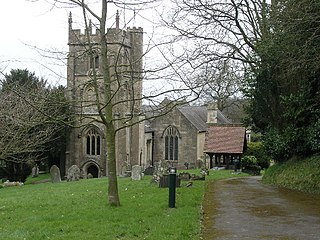
Camerton is a village and civil parish in Somerset, 6 miles (9.7 km) south west of Bath, lying on the Cam Brook. The parish has a population of 655.

Limpley Stoke is a village and civil parish in Wiltshire, England. It lies in the Avon valley between Bath and Freshford, and is both above and below the A36 road.

Flimby is a coastal village and former civil parish, now in the parish of Maryport, in the Cumberland district, in the ceremonial county of Cumbria, England. It was historically in Cumberland. It is included in the Maryport South county division of Cumbria County Council. In 1951 the parish had a population of 2066.
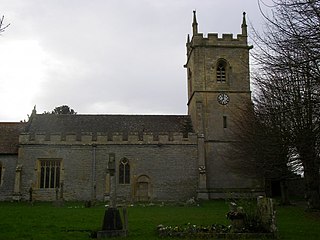
Hinton on the Green is a village and civil parish in the Wychavon district of Worcestershire in England. It is situated at the foot of Bredon Hill, about two miles south of Evesham.
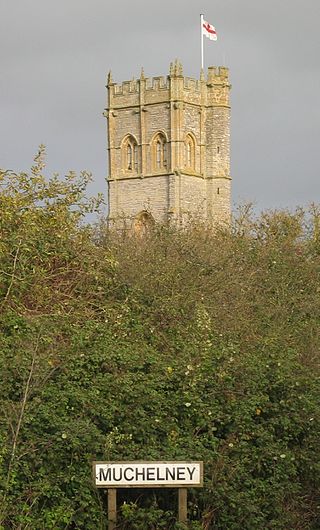
Muchelney is a clustered village and civil parish in Somerset, England, extending for 3 kilometres (1.9 mi) from the south bank of the River Parrett. The village lies about 1 mile (1.6 km) south of Langport and 4 miles (6.4 km) south west of Somerton, in the South Somerset district. The hamlets of Thorney and Muchelney Ham are in the south of the parish.

Camerton is a small village and civil parish in Cumbria, historically part of Cumberland, near the Lake District National Park in England. According to older maps, it was originally called "Camberton".

Cartmel Fell is a hamlet and a civil parish in the South Lakeland district of Cumbria, England. In the 2001 census the parish had a population of 309, increasing at the 2011 census to 329. The village of Cartmel and Cartmel Priory are not in this parish but in Lower Allithwaite, to the south: Cartmel Fell church is about 7 miles north of Cartmel Priory.

Great Broughton is a village and former civil parish, now in the parish of Broughton, in the Cumberland district, in the ceremonial county of Cumbria, England. It caters strongly for visitors. The estimated resident population was 1,823 in 2017.

Cliburn is a village and civil parish in the Eden district of Cumbria, England. The civil parish includes the hamlet of Town Head. In 2001 the population was 204, increasing to 274 at the 2011 Census.
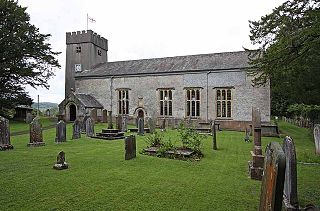
St Paul's Church is in the village of Witherslack, Cumbria, England. It is an active Anglican parish church in the deanery of Kendal, the archdeaconry of Westmorland and Furness, and the diocese of Carlisle. It is recorded in the National Heritage List for England as a designated Grade II* listed building. The authors of the Buildings of England series describe it as "an almost perfect example of a plain Gothic church of that date, honest and unpretentious".

St Peter's Church is a Church of England parish church at Dixton in Wales. It is situated on the banks of the River Wye, about 1 mile (1.6 km) north-east of Monmouth, Wales. The church is a Grade II* listed building and the cross in the churchyard is both a listed building and a scheduled monument.

During the twenty-four hours before Friday 20 November 2009, rainfall of over 300 mm (12 in) was recorded in Cumbria. Flooding along the Borrowdale and Derwent Valley meant that some areas were up to 8 feet (2.4 m) deep in water. The surge of water off the fells of the Lake District which flowed into Workington down the River Derwent washed away a road bridge and a footbridge. PC Bill Barker was killed when Northside Bridge collapsed. The cemetery at Camerton, historically the burial ground for the community of Seaton, was badly damaged with many gravestones being damaged or upturned.

St Lawrence's Church is in Boroughgate, Appleby-in-Westmorland, Cumbria, England. It is an active Anglican parish church in the deanery of Appleby, the archdeaconry of Carlisle, and the diocese of Carlisle. The parish is one of ten parishes which form the Heart of Eden benefice. Sunday worship is at 10.45am and on Fridays at 10am. The church is recorded in the National Heritage List for England as a designated Grade I listed building.

St Oswald's Church is in the village of Ravenstonedale, Cumbria, England. It is an active Anglican parish church in the deanery of Appleby, the archdeaconry of Carlisle, and the diocese of Carlisle. Its benefice is united with those of All Saints, Orton, and St James, Tebay. The church is recorded in the National Heritage List for England as a designated Grade I listed building.
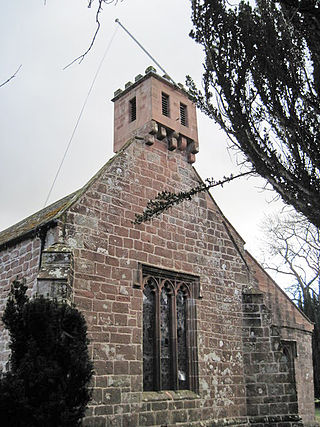
St Columba's Church is in the village of Warcop, Cumbria, England. It is an active Anglican parish church in the deanery of Appleby, the archdeaconry of Carlisle, and the diocese of Carlisle. Its benefice is united with St Theobald, Musgrave. and nine other parishes to form the Heart of Eden benefice. The church is recorded in the National Heritage List for England as a designated Grade I listed building. On Saint Peter's Day, 29 June, each year the church hosts a rushbearing ceremony.

The Church of Holy Trinity and St George is in New Road, Kendal, Cumbria, England. It is an active Roman Catholic parish church in the diocese of Lancaster. It is recorded in the National Heritage List for England as a designated Grade II* listed building. The church was founded by the parish priest, Thomas Wilkinson, and designed by local architect George Webster. Architectural historians regard the church as the best of the three designed by Webster in the town.
Camerton is a civil parish in the Borough of Allerdale in Cumbria, England. It contains three listed buildings that are recorded in the National Heritage List for England. All the listed buildings are designated at Grade II, the lowest of the three grades, which is applied to "buildings of national importance and special interest". The parish contains the village of Camerton and surrounding countryside. The listed buildings comprise a church, a country house, and a farmhouse and barn.




















